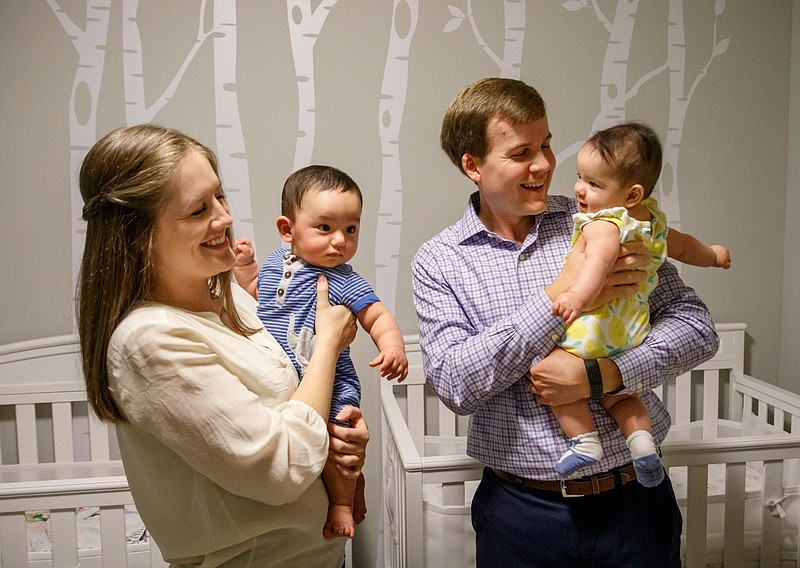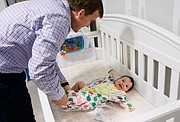John Gandy said he will celebrate Father's Day like a lot of fathers probably will - watching golf.
While the 29-year-old and new father watches the final round of the U.S. Open in the living room of his Chattanooga home, he will also be playing with and admiring the six-month-old twins he and his wife, Jourdan, are adopting. His big Father's Day present will come a day after the holiday when the adoption of the twins, a brother and sister, is legally finalized.
John, who is an investment officer at Unum, is one of the fathers who has taken advantage of the Chattanooga-based insurance company's six-week paid parental leave program that launched in 2018. John said he was the first one on his department's team to take advantage of the new leave program starting in December when the twins were born.
A survey recently conducted by Unum of 500 new U.S. parents across the country found that 37% of new fathers said they feel there is still a stigma in their workplace around new parents, with 80% of them experiencing it firsthand.
Even though 62% of the 500 parents surveyed said their employer offers paid parental leave, 50% spent 30 days or less away from the workplace when they had or adopted a child.
"While more dads say their workplace offers parental leave, it's clear that both new mothers and fathers are encountering stigma about actually taking time off," said Angel Bennett, director of Unum's Leave Management Center.
"For [Human Resources], this means having an open dialogue within the workplace, encouraging managers to lead by example in taking parental leave and supporting new moms and dads in the development of their leave and return-to-work plans."
John said he "wrestled" with the decision to take off the full six weeks last year.
He said his decision to take the full amount boiled down to three things - helping his stay-at-home wife and alleviating some of her burden, having six uninterrupted weeks with his family and setting a precedent for his team and colleagues to feel comfortable taking the paid parental leave themselves in the future.
"I have always been in finance, and I think there's definitely a stigma, especially for fathers," John said. "The neat thing at Unum is I was really encouraged to take it at every level by both colleagues and even the CEO."
About 40% of U.S. employers offer some amount of paid parental leave for both birth and non-birth parents, up from 25% reported in 2015, according to Mercer's 2018 Survey on Absence and Disability Management. The organization surveyed more than 400 employers.
The Family and Medical Leave Act law requires many employers to provide both male and female employees with 12 weeks of unpaid family leave after the birth or adoption of a child. But seven states actually offer paid parental leave, as well, including Connecticut, California, Rhode Island, New York, New Jersey, Washington and Massachusetts.
On a recent afternoon, the twins had just woken up from a nap and were content with being held in their parents' arms.
Jourdan said her daughter loves to be the center of attention and is always babbling. The boy is "much more chill," she explained. The parents said they did not want to disclose the children's names in order to protect their privacy.
"They love each other," Jourdan said. "They'll just stare at each other and talk and reach for each other."
John says he's a "pro" at changing diapers now and the six weeks helped them adjust to a new, shorter sleep schedule.
"I have this theory that some people are born with the ability to go on low sleep and others are not, and both Jourdan and I are eight-hour sleepers," he said.
"We were eight-hour sleepers," Jourdan chimed in.
"We were eight-hour sleepers," John agreed. "So, learning how to adapt to minimal sleep was a wake-up call. No pun intended."
John's advice for those new parents battling with whether or not to take longer parental leave is to take it because chances are, that time together won't happen again.
"Your job will always be there - work will always be there," he said. "But to have that family time with your children and your spouse, you just won't get it again."
Contact staff writer Allison Shirk Collins at ashirk@timesfreepress.com, @AllisonSCollins or 423-757-6651.

